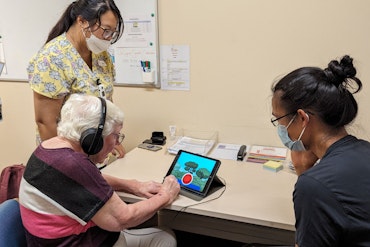Aged care sector’s major representatives announce intention to form new industry body
In a bid to change in line with the necessary reform to the aged care sector, Leading Age Services Australia (LASA), peak body for for-profit providers, and Aged and Community Services Australia (ACSA), peak body for not-for-profit providers, have announced their intention to amalgamate into a new overarching industry body.
![<p>Aged and Community Services Australia (ACSA) and Leading Age Services Australia (LASA) are planning to combine to create a new overarching peak body for the aged care sector. [Source: Shutterstock]</p>](https://agedcareguide-assets.imgix.net/news/articles/news/articles/15_12_2021-LASA-ACSA-merger.jpg?fm=pjpg&format=auto&w=550&q=65)
Aged and Community Services Australia (ACSA) and Leading Age Services Australia (LASA) are planning to combine to create a new overarching peak body for the aged care sector. [Source: Shutterstock]
The aim of this commitment to work together, by ACSA and LASA boards, is to better represent and support all providers of aged care services and deliver better outcomes for older Australians.
The Australian Aged Care Collaboration (AACC), which LASA and ACSA are both members of, commissioned KPMG, an audit and advisory group, to undertake a sector representation project this year, which looked into ways that industry peaks can better advocate for their sectors.
Even though the final report is yet to be finalised and released by KPMG, the two peak bodies have already announced their intention to transition over and are aiming to have new industry body model recommendations available to their Members by March 2022.
If ACSA and LASA Members endorse the proposal, the transition process to the new model will formally proceed and will hopefully be established by July 2022.
Chief Executive Officer (CEO) of LASA, Sean Rooney, says that the Australian aged care sector is undergoing significant transformation resulting from the Royal Commission into Aged Care Quality and Safety Final Report, and managing COVID-19, and the sector needs to adapt to these changes.
“There are more than 2,000 aged care providers in Australia who provide services that take care of vulnerable older Australians in need of residential care, support to stay at home or simply independent living arrangements,” explains Mr Rooney.
“Over the coming years these providers are facing huge challenges to adapt to major changes to the way they deliver care, the way they are funded, and the way the aged care system is governed.
“Aged care provider peak bodies like LASA and ACSA support their members to navigate these changes – providing a strong voice and helping hand – and they have never been needed as much as they are now.
“With the Government embarking on major reform of aged care over the next few years, now, more than ever, the aged care sector needs a unified approach to ensure the voices of the people and organisations who provide care are heard and that they are involved in shaping this transformational change.”
Mr Rooney says that ACSA and LASA have shared principles and consistent desired outcomes for the sector, so a unified approach to sector representation and development is needed.
The merging peaks do not believe one voice is achieved by ignoring differences, but by creating a conductor role through this new joint entity, which will coordinate the “diverse choir” of various aged care members’ voices.
Mr Rooney adds that there is too much at stake for Australia to not get this aged care reform right, so the peak bodies need to work together to avoid repeating past mistakes and implement once in a generation change.
“A unified approach resources and enables us to realise the goal of a high performing, respected and sustainable sector, that delivers high quality care and service to older Australians,” says Mr Rooney.
“ACSA and LASA have committed to a process to bring others together to realise this goal.”
Paul Sadler, CEO of ACSA, says that the Royal Commission has pushed the sector to work together and encourage better aged care, which is what a new overarching peak body will be able to achieve.
“It pushed us further, to work better to drive reform that improves the lives of older people, and provide a strong voice for aged care providers to influence Government directions and the media,” explains Mr Sadler.
“ACSA and LASA’s members have been calling for change, and so we are creating a new entity rather than simply merging ACSA and LASA. Our intention with this new entity is to improve the support provided to members.
“There is a level of duplication of effort between what ACSA and LASA do in supporting aged care providers. This [new industry body] gives us an opportunity to streamline our work to respond more efficiently to the needs of our members.
“Most importantly, it will provide a more resilient voice for aged care providers and enable us to advocate energetically for policy and program settings which improve outcomes for older people and their carers.
“ACSA is optimistic about the future, and so we need to engage our Members in the new year to ensure the final sector representation meets their needs, and is one they can support in a vote around March 2022.”
Mr Sadler will be leading the transition process for both the ACSA and LASA Boards, while Mr Rooney will lead “business-as-usual” for the two peaks bodies so members still have services and advocacy maintained throughout the first half of 2022.
LASA and ACSA intend to work with the Church peak bodies and the Aged Care Reform Network to develop a new representation model that is inclusive of the whole aged care industry.
Additionally, ACSA and LASA have agreed upon shared principles and desired outcomes for the new sector representation model, including:
- Represent the whole aged care sector including residential care, home care packages, and Commonwealth Home Support Program (CHSP) services, as well as retirement villages and other senior housing
- Advocate for a rich diversity of service providers, especially those who serve vulnerable communities or the needs of specific cultural groups
- Support diversity of specialist services and improved access to mainstream services across Regional, Rural and Remote areas; Culturally and Linguistically Diverse communities; Aboriginal and Torres Strait Islander communities, homeless older people, and other groups
- Maximize one voice advocacy capacity by setting the aged care agenda and responding to Government Five Pillars reforms
- Maintain existing and establish new strong relationships with Federal, State and Territory Governments, other provider peaks, consumer peaks, and existing or new sector alliances
- Minimise membership fees, especially for smaller members, through achieving efficiencies, and expanding core advocacy, member support and advice capacity
- Provide enhanced member support services such as training, events, consultancy, and more
- Support and fund a structured transition program which allows essential advocacy work via AACC and member support via ACSA and LASA to continue uninterrupted while any new model is established
The AACC has supported the announcement from ACSA and LASA, as it says it is “a key moment in the transformation of the aged care system”.
“It demonstrates the leadership needed for the sector to come together to realise the Royal Commission’s vision for a better aged care system,” says AACC.
“The AACC commits to working with [its] members and all other aged care providers to realise the promise of this moment. We intend to grasp this ‘once in a generation’ opportunity to achieve a better aged care system that is rights based, and truly person centred.”
CEO of the Aged Care Workforce Industry Council, Louise O’Neill, has welcomed the recent announcement from ACSA and LASA on their plan to work together with all key provider groups to create a single representative peak body for aged care providers.
“Strong governance and coordinated leadership is vital to support positive outcomes for the aged care workforce and the sector more broadly during this period of rapid structural change,” says Ms O’Neill.
“We look forward to working with the new entity to continue the reform and growth of Australia’s aged care workforce.”
ACSA and LASA are awaiting for the KPMG report to be delivered to the AACC, which will give direction on the transition process.























